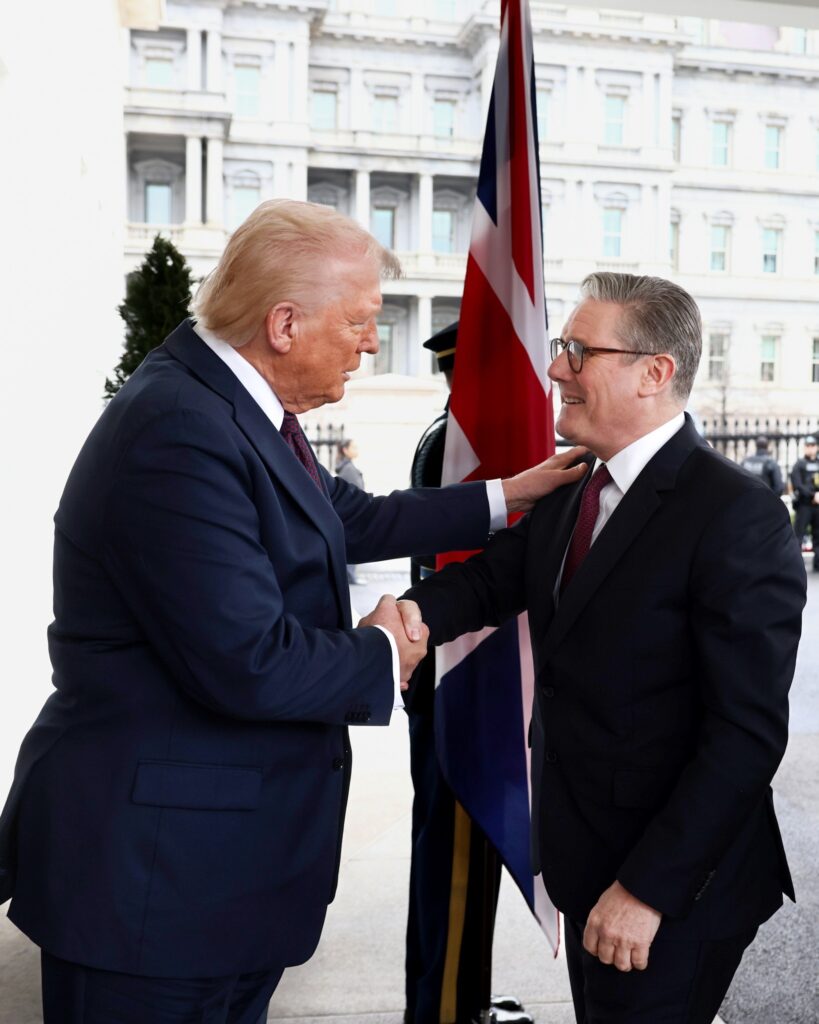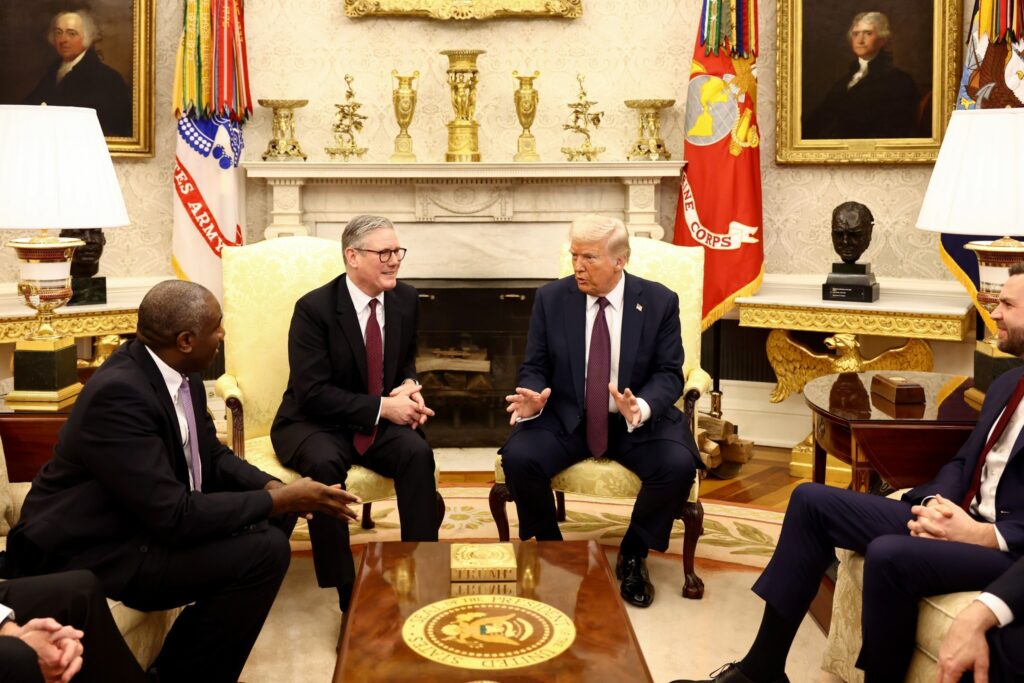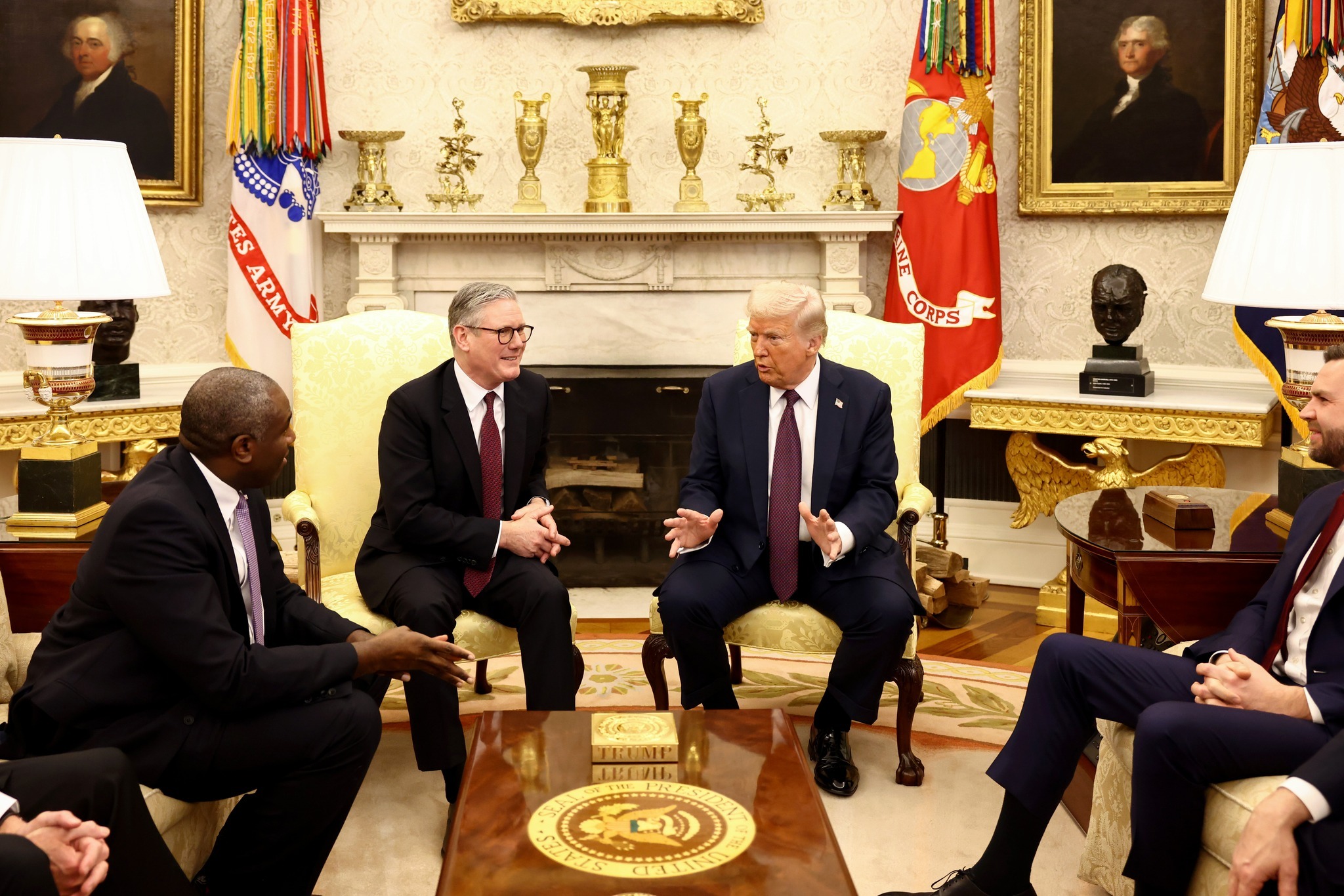
President Donald Trump remains a key figure in shaping political and economic debates, both in the United States and internationally. Today, his engagements with UK Prime Minister Keir Starmer touched on significant matters, including the U.S.-U.K. alliance, the war in Ukraine, NATO obligations, and economic partnerships.
us-uk ties
Donald Trump today met with U.K. Prime Minister Keir Starmer at the White House, reinforcing the longstanding “special relationship” between the United States and the United Kingdom. Both leaders acknowledged their nations’ historical ties and pledged to maintain strong diplomatic, military, and economic collaboration.
A significant moment in the meeting was Trump’s acceptance of a historic second state visit to the U.K., an invitation extended by King Charles III. The visit, unprecedented for any U.S. president, underscores the significance of the U.S.-U.K. relationship. President Trump also reinstated a bust of Winston Churchill in the Oval Office, signaling a return to a traditional bond between the two nations.
In addition to diplomatic relations, both leaders discussed collaborative efforts in technology and innovation. The U.S. and U.K. have long been leaders in research, artificial intelligence, and biotechnology, and both nations pledged to deepen cooperation in these fields. The strengthening of technological ties could lead to advancements in healthcare, cybersecurity, and digital infrastructure.
Addressing the Conflict in Ukraine
One of the most pressing issues discussed was the war in Ukraine. President Donald Trump reiterated his stance that the war would not have occurred under his administration and emphasized efforts to bring about a swift resolution. He revealed his Engagement in back-to-back calls with Russian President Vladimir Putin and Ukrainian President Volodymyr Zelensky to negotiate peace. According to Trump, these discussions have led to “rapid progress” toward ending the conflict, though details remain scarce.
A major breakthrough announced was an agreement between the U.S. and Ukraine, wherein the U.S. will assist in developing Ukraine’s rare earth minerals and energy sectors. Trump highlighted this deal as beneficial for both nations, providing Ukraine with economic stability while reimbursing the American taxpayer for financial aid provided to Kyiv.
Beyond economic considerations, Trump outlined a plan for a potential ceasefire that would require both Russia and Ukraine to agree on terms of neutrality. Trump suggested that a peacekeeping force, potentially composed of NATO members and other allies, could be deployed to ensure stability in the region. Critics argue that such a proposal could be difficult to enforce, but supporters view it as a necessary step toward preventing prolonged conflict.
NATO and European Defense Expenditure

President Donald Trump has long criticized NATO members for underfunding their defense obligations, often calling for increased military investments from European nations. In his discussions with Starmer, he reiterated the need for the U.K. and other NATO allies to commit more substantial resources to defense.
Keir Starmer, in response, detailed Britain’s plans for increased military spending, emphasizing that the U.K. is committed to reinforcing its defense capabilities. He assured Trump that his government was taking necessary steps to modernize the military and meet NATO expectations.
Their discussion also touched on cybersecurity threats and the role of NATO in preventing digital attacks. As cyber warfare becomes an increasing concern, both the U.S. and the U.K. agreed to enhance intelligence-sharing and cybersecurity cooperation. This development signals a growing recognition that modern conflicts extend beyond traditional battlefields.
Trade Agreements and Economic Collaboration
Trump and Starmer also discussed potential trade agreements, with both sides expressing optimism about finalizing a mutually beneficial deal. Trump criticized past U.S. trade policies, particularly under the Biden administration, and emphasized the need for “fair and reciprocal” agreements that benefit American industries.
President Donald Trump praised British economic contributions to the U.S., noting that the two nations have over $1.5 trillion invested in each other’s economies, creating millions of jobs. He emphasized the need to enhance technological and trade partnerships in sectors like artificial intelligence, pharmaceuticals, and energy.
PM Keir Starmer, in turn, highlighted Britain’s desire to expand exports to the U.S., particularly in the areas of manufacturing and clean energy. With the growing global demand for sustainable energy solutions, both leaders acknowledged the need to collaborate on renewable energy technologies, including nuclear and hydrogen power.
U.S. Investment in the Natural Resources of Ukraine
A pivotal element of Trump’s approach to the Ukraine crisis is leveraging economic investments to stabilize the region. Under the newly announced agreement, U.S. firms will be involved in mining and extracting rare earth minerals in Ukraine. These resources are crucial for high-tech industries, including electric vehicles, semiconductors, and defense technologies.
This arrangement marks a shift from traditional military aid toward a more self-sustaining model, wherein Ukraine’s economic development will contribute to its own reconstruction. Trump emphasized that this partnership would not only help Ukraine recover from the war but also ensure that American taxpayers see a return on their investment.
Further, Trump stated that economic revitalization efforts in Ukraine could create a model for other war-torn regions. By prioritizing investment and infrastructure development, he suggested that future conflicts might be mitigated through economic cooperation rather than prolonged military engagement.
Tariffs and Economic Policies
President Trump defended his stance on tariffs, stating that they serve as a necessary measure to counter unfair trade practices by foreign nations. He dismissed claims that tariffs contribute to inflation, arguing instead that they level the playing field for American businesses.
During his address, Trump also hinted at potential tariffs on U.K. goods, though he acknowledged the close economic ties between the two nations. The discussions with Starmer also included efforts to negotiate trade terms that will prevent such tariffs from being implemented.
In addition, Trump outlined his vision for a renewed focus on American manufacturing, proposing tax incentives for companies that bring production back to the U.S. He stated that his administration would prioritize policies that support domestic industry growth while reducing reliance on foreign supply chains.
The Future of Global Security and Peacekeeping
The two leaders emphasized the importance of ensuring long-term peace and stability in Eastern Europe. PM Keir Starmer reiterated the U.K.’s commitment to supporting Ukraine with military aid and hinted at the possibility of deploying British forces for peacekeeping operations if a ceasefire is achieved.
Trump stated that any peace deal must be “lasting and enforceable,” ensuring that Russia does not use a ceasefire as an opportunity to regroup and launch future aggression. He also encouraged European nations to take on a more active role in regional security rather than relying heavily on U.S. intervention.
Conclusion
President Donald Trump’s recent diplomatic engagements highlight his strategic approach to global politics, emphasizing economic partnerships, military investments, and strong alliances. His interactions with Prime Minister Starmer and discussions about NATO, Ukraine, and trade agreements reflect his broader vision of reinforcing American leadership while ensuring financial accountability.
While President Trump’s critics argue that his policies could strain diplomatic relationships, his supporters see them as necessary steps toward a stronger and more self-sufficient America. As the world watches these developments unfold, the future of U.S. foreign policy remains closely tied to Trump’s continued influence on the global stage.
With increasing geopolitical tensions and economic challenges ahead, Trump’s approach—focused on leveraging economic strength to achieve foreign policy objectives. The coming months will reveal how these negotiations progress and whether his strategies gain traction on the international stage.

2 thoughts on “Trump Holds a Press Conference with Keir Starmer.”
Comments are closed.